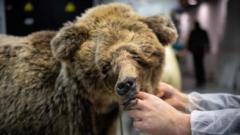An elderly hunter was sentenced for killing an endangered bear, sparking debates on wildlife conservation and the ethics of hunting in restricted areas. Environmental advocates express hope that the ruling will lead to greater awareness within the hunting community.
French Court Sentences Hunter for Killing Endangered Bear Amid Controversy

French Court Sentences Hunter for Killing Endangered Bear Amid Controversy
An 81-year-old man faces legal repercussions after fatally shooting a protected bear during a hunting expedition in the French Pyrenees, prompting discussions on wildlife preservation and hunting regulations.
An 81-year-old hunter in France received a four-month suspended prison sentence and a €750 fine for killing an endangered bear in 2021 during a boar-hunting trip in the Pyrenees mountains. The bear, known as Caramelles, was shot after the hunter claimed it attacked him. Following the incident, a total of 15 hunters were penalized and ordered to pay over €60,000 in damages to environmental NGOs that had taken legal action.
The court case unfolded in the Foix Criminal Court, where it was revealed that the group of hunters was targeting boars in a protected area. The encounter escalated when the mother bear charged at the hunters after they came across her cubs. Testifying about the attack, the hunter stated that the bear clamped down on his leg, leading him to fire his weapon in self-defense.
However, the court ruled that the hunters should not have been in a restricted zone, approximately 1,300 feet beyond authorized hunting grounds. Defense attorney Fanny Campagne contended that there was a lack of signage indicating that hunting was illegal in the area.
The outcome of the case has drawn mixed reactions. The bear-preservation group Pays de l'ours expressed satisfaction with the verdict, highlighting the importance of holding all hunters accountable and hoping that this will raise awareness about wildlife protection in the hunting community.
Historically, the population of brown bears in the Pyrenees faced significant declines, with numbers dropping to around 70 by 1954. Thanks to reintroduction efforts since the 1990s, the population has gradually rebounded, with estimates suggesting there are now approximately 96 bears in the region as of 2024, according to the French Office for Biodiversity.


















